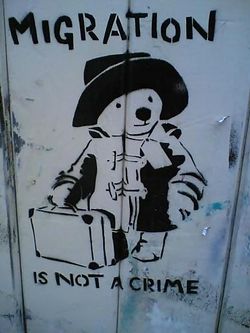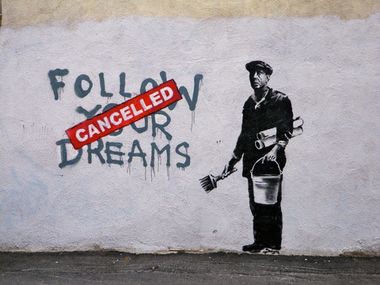Freedom of movement
(freedom) | |
|---|---|
 | |
Contents
National borders
Generally, passports and often also visas are required for international travel. This restriction was systematised after World War I. In France, visa restrictions were introduced amid anxiety about potential soldiers fleeing the country. This policy was disguised as a method to prevent German spies from entering the country.[citation needed]
In 2012? [When?][citation needed] the US government afforded itself the right to remove US citizens' passports without due process if it suspected them of "terrorism".
Migration
- Full article:
 Migration
Migration
- Full article:
Immigrants are sometimes scapegoated, and given deprecatory labels such as "aliens" or "economic migrants".
Imprisonment
The rise of the carceral state in USA is unprecedented, and whilst other nations have far fewer actual prisoners, many states have harsh visa requirements or immigration policies which limit people's freedom of movement. 'Economic Globalisation' has allowed greater freedom of movement within the European Union, but globally, the case is not so straightforward.
Ethnic Japanese living in USA were imprisoned during World War II.[citation needed]
By country
China
- Full article: “Strike Hard Campaign”
- Full article: “Strike Hard Campaign”
Since 2016, the Chinese "Strike Hard Campaign" has increasingly restricted the movement of 13 million ethnic Uyghurs and other Turkic Muslims in Xinjiang. An unknown number have been imprisoned in "re-education camps".[citation needed]
UK
The Counter-Terrorism and Border Security Act 2019 made it illegal to travel to regions the UK government decreed as off limits, punishable by 10 years in prison.[1][2]
Australia
The Australian government has banned its citizens from travelling to specific areas.[3]
Predictions
In 2019 Ole Dammegård predicted increasing restrictions on movement of people.
Related Documents
| Title | Type | Publication date | Author(s) | Description |
|---|---|---|---|---|
| Document:Boris Johnson's first two priorities for post-Brexit Britain | Article | 1 February 2020 | Richard Murphy | Boris Johnson has admitted what Brexit was for. He wants to control and constrain people. The market in labour will be constrained. And let’s not for a moment pretend that a Freeport supports markets: freeports are instead about permitting the free movement of capital beyond the control of the state and without the imposition of any taxes. |
| Document:Britain didn’t vote Labour just to get a new iron chancellor | Article | 4 August 2024 | William Keegan | The economic damage wrought by Brexit continues. Our investment and growth prospects would benefit enormously if Starmer and Reeves abandoned this policy of “no return to the customs union, single market or freedom of movement”. I repeat what I have said before: the Labour manifesto commits it to removing unnecessary barriers to trade. But Brexit is the most formidable barrier of all! |
References
- ↑ https://www.independent.co.uk/news/uk/politics/terror-laws-home-office-designated-areas-three-clicks-human-rights-border-security-bill-a8525666.html
- ↑ https://sputniknews.com/europe/201904121074071817-terrorism-hotspot-areas-law-uk/
- ↑ https://www.independent.co.uk/news/uk/politics/terror-laws-home-office-designated-areas-three-clicks-human-rights-border-security-bill-a8525666.html
